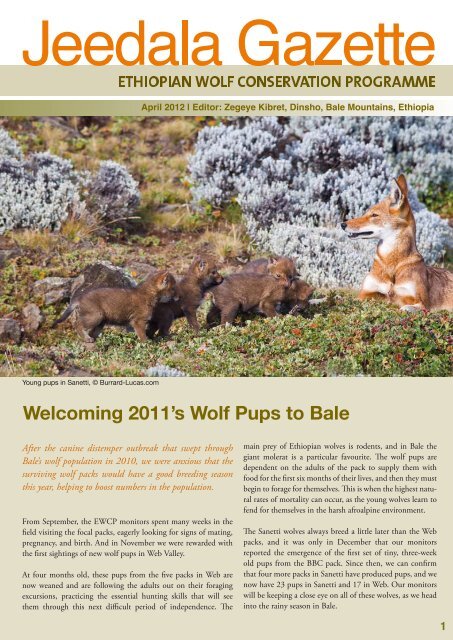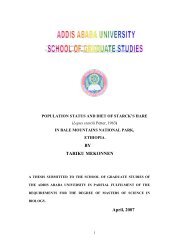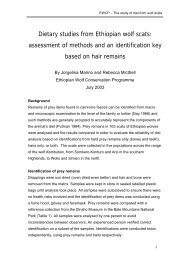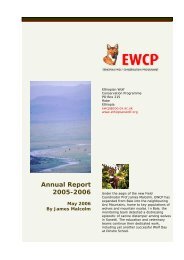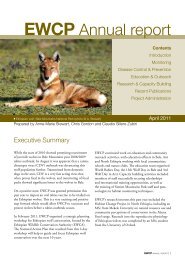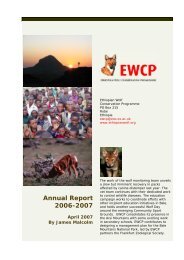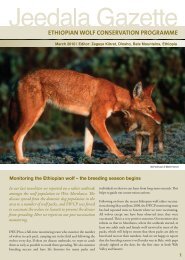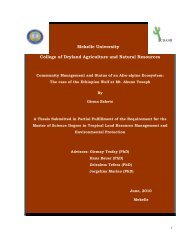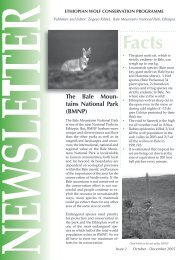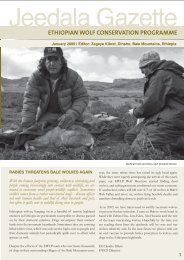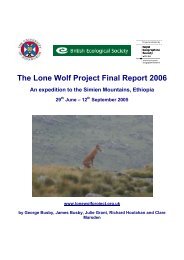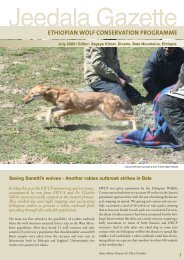pdf - 1.6Mb - Ethiopian Wolf Conservation Programme
pdf - 1.6Mb - Ethiopian Wolf Conservation Programme
pdf - 1.6Mb - Ethiopian Wolf Conservation Programme
- No tags were found...
Create successful ePaper yourself
Turn your PDF publications into a flip-book with our unique Google optimized e-Paper software.
NEWSEdriss Ebu honored asDisney <strong>Conservation</strong> HeroRecently, EWCP’s <strong>Programme</strong> Manager, Edriss Ebu, wasnominated by EWCP for a Disney <strong>Conservation</strong> Hero Award.Edriss successfully competed against many other internationalnominees to win the award, which recognizes his commitment to<strong>Ethiopian</strong> wolf conservation and his work for EWCP over the past20 years. EWCP is very proud of Edriss and his continued dedicationto the programme. The award has also encouraged the EWCPstaff to continue with their important work, and to recognize thatthey are all successful as a team. Congratulations Edriss!World Rabies Day 2011Rabies Day was a huge success in 2011, with the celebrationsmoving from their usual location in Dinsho to another townalongside wolf habitat, Goba. The Sanetti Primary School werethe hosts for the celebrations, and did a great job! On the morningof October 5, everyone met at the school, from where more than200 pupils, teachers and other supporters marched on the road tothe Goba market, holding banners, wolf posters and deliveringrabies booklets to the mountain residents who were coming to themarket. “Stop Rabies!”, “Vaccinate your dogs!”, “Save lives!”,“Protect the <strong>Ethiopian</strong> wolf!” were some of the messages spread inAfaan Oromo, Amharic and English. Back at the school therewere art competitions, poems, and quizzes, along with a veryinteresting drama on how to combat rabies. The day was a hugesuccess in helping to raise awareness about this deadly disease thatremains as one of the largest threats to the <strong>Ethiopian</strong> wolves.Thank you to everyone who made it possible, including theEWCP team, the Bale Beauty Nature Club, the Goba Town andEducation Office and the Sanetti Primary School.The Tourism Ministervisits BaleHis Excellency Mr. Aman Abdulkedir, the Minister of Cultureand Tourism of the Federal Democratic Republic of Ethiopia,recently visited the Bale Mountains National Park, accompaniedby members of the <strong>Ethiopian</strong> Wildlife <strong>Conservation</strong> Authority,including Dr Kifle Argaw and Mr Kahsay Asgedom. It was a goodopportunity to meet and talk to the enthusiastic Minister, whoshowed a great interest in wildlife and the Park. The Ministervisited Sanetti, accompanied by Park staff and the EWCP educationofficer, Zegeye Kibret. He also had a chance to visit theEWCP offices and museum, where he met with the EWCP FieldDirector, Anne-Marie Stewart, and talked about the challengesfacing <strong>Ethiopian</strong> wolf conservation. The Minister encouraged theteam to keep up the good work, as conservation of Ethiopia’swildlife is very important for both Ethiopia’s natural heritage andto promote tourism in the country.Oromifaa articleBishaanArdiin keenya harki 75% bishaaniin uffifamtee jirt. Kunisgalaanota gurguddoo, haroo, laggeen, burqaalee fi bishaanardii jalaa yammuu dabalatu kan hafan immoo biqilootakeessaa fi qileensa keessa akkasumas dumessaa fi cabbiiykn baradaa ta’anii argamu.Bishaan qabeenya uumamaa keessaa isa tokko yammuuta’u isa malee lubbuun ardii kana irratti jiraachuu hindanda’u. Bishaan qulqulluu dhugaatiif ta’u %1 gad qofaadha. Kan hafan soogidda kan qaban ykn cabbii duumessaafi biqiltuu fi ardii jala waan jiraataniif laggeen qulqulluu gaarreenirraa gad yaa’an qofatti fayyadamna.Dabalataan qabeenya uumamaa keessa isa tokko kan ta’ebishaan dhugaatiif, nyaata bilcheessuuf, dhiqachuuf, jallisiifi biqiltuu biqilchuuf, bineensota bosonaa fi loon obaasuufakkasumas madda humna elektirikaa ta’uun bu’aaleehangana hin jedhamne nu namaafi lubbu qabeeyii biro tiif nifayyadu. Garreewwan gurguddoon Itoophiyaa maddalaggeen baay’ee fi kalattii hundatti yaa’uun bu’aaleearmaan olitti tuqaman hunda kennaa jiru. Gaarreenkanneen kunuunsuu baannaan miidhaan lubbu qabeeyii finamoota irra gahu baay’ee guddaa dha.Bishaan Lubbu dha!The Web River.Gaarreewwan Itoophiyaa namoota biyya keesaa fi biyyootaollaatti argaman kan kumaatamaan lakkaa’amaniif bishaandhiyessuu irratti ga’ee guddaa gumaachu. Gaarreewwanakka ispoongiitti ganna keessa rooba of keessaatti xuuxuunwaggaa guutuu burqaa fi laga ta’uun gad lakkisuunnamoota gaaraa gaditti aragman ni fayyadu.Humni elektirika Itoophiyaa bishaan gahaa hidha maddaelektirikaatti gahuu irratti hundaa’a. Bishaan malee humanelektirikaa nuti feenu ykn maddisiisuu barbaannu hin argannu.Yoo Garren kunuunsine gaarreen bu’aa kana nuuf kennu.Bineensota bosonaa isaan keessatti argamanis ni eegnaykn kunuunsina.Gaarreen kana yoo mancaasnee qonne, humnaan ala yoodheechisne ykn horii baay’ee yoo itti bobbaasne gaarreenkun bishaan qabatanii gad hin lakkisan. Nutis ni miidhamna.Beelli fi gogiinsi lafaa hunda ni miidha. Kanaafuu gaarrenkunuunsuun lubbuu qabeeyyii hundaa kunuunsuu dha!3
Meet the EWCP Vaccination Team!Our guests for this issue are theEWCP Vaccination Team, whotravel throughout the BaleMountains to vaccinatedomestic dogs against diseaseslike rabies. There are many dogsliving in Bale who move throughwolf range and may transmitdiseases to the endangered<strong>Ethiopian</strong> wolf. Read here aboutwhat it is like to work for thevaccination team and how youcan help to stop rabies.The EWCP vaccination team, Abubaker, Muktar and Kebede.4Q: Please tell us about your job with EWCP.Muktar Abute: I work for EWCP and I am the vaccinationteam leader. Our team works to vaccinate dogsagainst rabies and canine distemper. My job is to give thecorrect vaccination to the dog, and to take charge of thevet equipment and vaccines.Kebede Wolde: I am EWCP employee working withvaccination team. I keep the records of all dogs that arevaccinated or not. I also give a certificate for each dogthat is vaccinated for our records. In addition I recordnew settlements in the Park within the wolf range.Abubaker Hussein: I work for EWCP in a position ofdog catcher for the vaccination team, whose goal is tostop rabies through dog vaccinations.Q. How many dogs do you vaccinate in one day?All: It depends on the awareness and willingness of thecommunity. When people are very cooperative and theybring their dogs to us or have their dogs tied up at theirhouses, we can vaccinate up to 50 dogs a day. But if wedon’t have cooperation from the people or we have tochase the dogs, then we vaccinate 20 to 30 dogs each day.Q. Why is your job important for wolf conservation?Muktar Abute: It is the backbone of EWCP’s work. Ourwork helps to control and decrease the chance of adisease outbreak, such as rabies. It is important for thewolves, and it is also a way of helping the communityfrom being infected by rabies and canine distemper. Since1996 we have vaccinated over 65 000 domestic dogs.Kebede Wolde: As a vet team our work saves the wolvesfrom rabies. For my own work, unless I keep the recordsand give the vaccination certificate, we can’t understandwhich dog is vaccinated or not. It also helps EWCPanalyze how many dogs are vaccinated per year as wellas how many new dogs are born, and helps us decidewhich area we need to focus to stop rabies and save thewolves.Abubaker Hussein: My job is important to conserve the<strong>Ethiopian</strong> wolf. If we vaccinate dogs in and around thewolf range we will minimize the risk of rabies to thewolves. So our job is important to save these wolves.Q. What is the hardest part of your job?Muktar Abute: The hardest part of our job is to go fromhouse to house in the areas where many settlements arescattered or far apart in a difficult landscape, whichmakes it hard to catch and vaccinate dogs.Kebede Wolde: The hardest part of our job is to go fromhouse to house to convince people to vaccinate their owndogs against disease. Those people who are not telling usenough or giving us reliable information and those peoplewho do not keep their dog certificate make our work harder.
InterviewAbubaker Hussein: My job is very difficult. I have to travelin the mountains to catch the dogs that are not easy to catch.I might be bitten by other dogs while I catch and strugglewith one of them until we manage to vaccinate it. Whenpeople are not helpful it is also a frustrating part of my job.Q. What can the community do to help you and thewolves?Muktar Abute: They must help us to vaccinate dogsagainst disease such as rabies and canine distemper. Theymust tie up their dogs near the house. They should alsokeep their certificates for us to see when we come backto that house.Kebede Wolde: People must minimize the number ofdogs. Get one dog that is tied, and then look after it properly.If you take care of your dog there is less chance ofit getting rabies. In case you think your dog has rabies,because it is tied you can make a decision without affectingothers. Please help us.Abubaker Hussein: My advice is that people must keeptheir dogs tied and they must feed them well so that theyhave got less chance of getting the disease and going intothe mountains to spread the disease to the wolves. Pleasehelp us to vaccinate your dogs.Q. Do you have a message for the people of Bale?Muktar Abute: Let us conserve the <strong>Ethiopian</strong> wolftogether. Let us vaccinate as many dogs as possible anderadicate the disease and please give us disease informationso that we can take proper actions to save lives. Letus also protect the wolf habitat while we try to combatthe killer disease in their mountains.Kebede Wolde: I want everyone to understand that the<strong>Ethiopian</strong> wolf is not only EWCP’s. They belong to us,our country and the world. Once we lose them wecannot get them back. We all together must act to stopthe disease and save the wolves, other wild animals,livestock and ourselves. Rabies kills.Abubaker Hussein: I want the local people to understandwhat we have been doing and how important it isto eradicate this killer disease. Then we can all worktogether to save the wolves, livestock and the people.Vaccinating domestic dogs in Karari5
School& CommunityPAGE6Dinsho Primary pupils with some of their new textbooks.Desks and dancing at Dinsho PrimaryEWCP has a long-standing and very positive relationship withthe Dinsho Primary School, where we carry out regulareducation activities, which include supporting the school’snature club. Through Born Free’s Global Friends Initiative,EWCP has helped the school in the past to build newclassrooms and buy textbooks and stationery.Born Free and EWCP recently pledged funds to help the schoolwith their tree nursery, as well as buying much-needed desksand books. Over the past few months EWCP has helped theschool to buy the textbooks and fencing material, and alsoordered over 60 desks to be made by a local carpenters’ group,thereby benefitting both the carpenters and the school. Tothank Born Free and EWCP for their generosity, the school helda fantastic celebration of traditional dancing, singing anddramas, all dealing with conservation issues and saving the<strong>Ethiopian</strong> wolf. Speeches were also made by the school head,and teachers. EWCP will continue to work closely with thepupils, to foster an appreciation of their natural environmentand a desire to make a positive change.ACTIONBishaan roobaa walitti qabuun waan adda addaatiiffayyadamuu dandeenya.Bona keessatti ashaakiltii fi biqiltuu dhaabnee obaasuun ittifayyadamuu ni dandeenya.Laggeen keessatti miicuu dhiisuun miidhaa fayyaa nurragahuu hambisuu ni dandeenya.Bishaan qusanaan fayyadamuun akka hin dhumne ni qarqaara.EWCP’s <strong>Wolf</strong> AmbassadorsThere are four wolf populations in North Ethiopia and EWCPhas been monitoring all of them since 2000. These populationsare all very small and vulnerable to extinction. In order toimprove our monitoring presence there, in November last yearwe recruited three <strong>Wolf</strong> Ambassadors in core wolf areas of theWollo highlands. One of them is Tesfaye Milashu from AboiGara, a friend of EWCP since we first visited the Afroalpinerange in 1999. Aboi Gara recently became a communityprotected area and Tesfaye is also one of the communityguards appointed by the kebeles to control the livestockexclusion border. Our <strong>Wolf</strong> Ambassadors represent EWCP intheir local areas and monitor the wolf packs there. They gathermonitoring data and are alert to problems such as disease orpersecution. We hope to extend the ambassador project intomore wolf areas in the future.The EWCP <strong>Wolf</strong> Monitor and <strong>Wolf</strong> Ambassador in Aboi GaraWater is life!FACTS• The highlands of Ethiopia play a vital role in providing waterto millions of people in Ethiopia and its neighbouringcountries. The mountains act like a big sponge, soaking up rainduring the wet season and letting it flow to people downstreamthroughout the year, in many rivers and streams.• By protecting the mountains, we will be preserving the importantjob they do of providing us and Ethiopia’s wildlife with water.• Ethiopia’s electricity supply depends on a good flow of water intothe hydroelectric dams. Without water, there would be no electricity.• If the highlands are destroyed, and the land is ploughed forcrops or overgrazed by cattle and sheep, the mountains can nolonger hold water, and the streams and rivers will dry up,resulting in droughts.
AMHARICARTICLEANIMALPAGEThe Common Warthog,Phacochoerus africanusEWCPWarthogs are widespread in Africa, and are known as Karkarrooor Boyyee in Bale and Arsi. They have one pair of tusks andeither one or two pairs of wart-like growths on their long faces,depending on whether they are female or male. The warthog’stusks are sharp weapons used against such predators as lionsand leopards. Warthogs have stocky grey bodies with thin legs,and a long, tufted tail. Their diet includes grass, berries, barkand roots, and they may scavenge on carcasses. They arenormally diurnal, spending the night in burrows, but in placeswith heavy human activity warthogs may become nocturnal.One or two females with their young form small groupstogether, which a male may join briefly during the matingseason. Young males form bachelor groups, but older males aresolitary. Young males separate from their mother after amaximum of 15 months. Females may stay with their motherfor their entire lives.In Bale, warthogs were once quite difficult to see, but since theformation of the National Park, their numbers have increased.They are now widespread in Gaysay and the northern woodlands,as well as around the Park headquarters and the Harennaforest. Many visitors enjoy seeing them during their visit to thePark, especially when they have piglets with them. However,locals mistakenly think that warthogs should be removed toleave more space for other animals such as the mountain nyalaand bushbuck. What these people need to understand is thatwarthogs form an important part of the ecosystem – they eatdifferent food to the antelope species and play a vital role in thefood chain. We should have respect for all wildlife as they allhave a role to play in nature, not just the ones we think aremore ‘beautiful’!7
Jeedala Gazette Issue 12 April 2012Amharic PoemDo you know about EWCP?© A. L. HarringtonThe mission of the <strong>Ethiopian</strong> <strong>Wolf</strong> <strong>Conservation</strong><strong>Programme</strong> is to conserve the endangered <strong>Ethiopian</strong> wolfand its Afroalpine habitat by addressing the most urgentthreats to its long-term survival.EWCP promotes sustainable solutions for the conservationof <strong>Ethiopian</strong> wolves by addressing particular aspects of themost serious threats affecting their populations. The work iscentred on capacity building, monitoring the wolves and theuse of Afroalpine resources, disease prevention and control,community education campaigns, habitat protection support,and population management.EWCP, PO Box 215, Bale, Robe Ethiopiainfo@ethiopianwolf.orgwww.ethiopianwolf.orgEWCPThis poem was one of the best entries we had for World RabiesDay 2011. It was written by Mahilet Degefa from Sanetti School.8© EWCP 2012 - A WildCRU endeavour in partnership with Ethiopia's Wildlife <strong>Conservation</strong> Authority and Regional Governments.Funded chiefly by the Born Free Foundation and the Wildlife <strong>Conservation</strong> Network. Under the aegis of IUCN/SSC Canid Specialist Group


